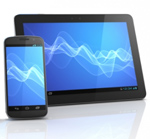 These days, tech journalists are predicting the imminent demise of the desktop computer. They base their forecast on the latest sales figures which revealed that a total of 87.5 million PCs were shipped in the second quarter of 2012, 0.1% less than in the same period in 2011.
These days, tech journalists are predicting the imminent demise of the desktop computer. They base their forecast on the latest sales figures which revealed that a total of 87.5 million PCs were shipped in the second quarter of 2012, 0.1% less than in the same period in 2011.
The bidorbuy Recent Buys section confirms that desktop PCs are less – much less – popular than laptops. And laptops, in their turn, are a little less popular than tablets. During the last seven days, bidorbuyers bought 10 desktop computers; about 150 laptops or netbooks; and about 170 tablets.
Some say the sales are slow simply because computers are made to last longer, both in homes and businesses.
Some say that the problem is that PCs are now less attractive to consumers, who are more likely to spend on the latest smartphones and tablets.
One reviewer recently pointed out another possible reason for the raising popularity of tablets, to the detriment of desktop computers and laptops: they do not scare people.
“I can find no better example of the intimidation factor than my elderly mother”, he says. “She has actively shunned computers and gadgets her entire life, as they scare her. When the iPad was first introduced, I handed one to her without saying a word. She immediately began touching the screen, and with no prompting was looking at photos of her grandchildren.”
Still, given the limited capabilities of tablets, we’d be reluctant to write off laptops, or desktop computers, just yet. Computers proper (whether mobile or desktop-bound) offer more processing power. They also allow you to fiddle with them, changing and upgrading things. Especially the desktops.
True, computers do not always behave predictably, the way tablets do, but then, challenges are one of the charms of computing life.









